| Srl | Item |
| 1 |
ID:
120641


|
|
|
|
|
| Publication |
2012.
|
| Summary/Abstract |
US space exploration policy deliberations tend not to include citizens who lack direct, vested financial interests in the space enterprise. Could expanding the circle of US space policy development players to involve citizens more aptly serve space exploration and the interests of American democratic society in the 21st century? I evaluate the merits and feasibility of citizen participation, drawing upon democratic theory and scholarship analyzing public participation in techno-scientific matters, previous experiences of public involvement in space exploration policy formation, and reflections on my professional experiences in space policy development. I argue that public engagement will enrich the debate surrounding the US future in space and may point toward a program American citizens will support as a meaningful future in the cosmos. I suggest three guiding principles and outline four mechanisms that, if embraced by US space policy makers, could foster meaningful public participation in informing the US space exploration agenda.
|
|
|
|
|
|
|
|
|
|
|
|
|
|
|
|
| 2 |
ID:
193549
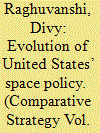

|
|
|
|
|
| Summary/Abstract |
United States space policy has largely reflected the outlook of a major power. The key distinguishing feature of such a state is their willingness to proactively reshape and engage with international regimes and organizations. They do this to protect their strategic goals and national interest. US space policy has historically been shaped by geopolitical tensions and rivalries. Its space policy is an extension of the military doctrines and strategies that it subsequently developed. The article examines different periods since the start of the space race. These periods reflect how US space policy has adapted to meet new challenges.
|
|
|
|
|
|
|
|
|
|
|
|
|
|
|
|
| 3 |
ID:
110123
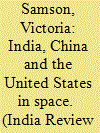

|
|
|
| 4 |
ID:
147524
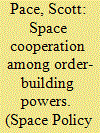

|
|
|
|
|
| Summary/Abstract |
The global community is threatened by several kinds of disorder, including regional instabilities on land and the high seas (e.g., Ukraine, South China Sea). In addition, developing Russian and Chinese counterspace capabilities are creating new tensions in space. This article discusses similarities and differences between the maritime and space domains, governance, and how international cooperation in these domains could contribute to international stability. Current difficult questions related to the exercise of the right of self-defense in space are addressed with suggestions for future research. In light of the increasing importance and globalization of space activities, new norms of behavior in space need to be developed by like-minded national to create a more stable and secure international order.
|
|
|
|
|
|
|
|
|
|
|
|
|
|
|
|
| 5 |
ID:
100223
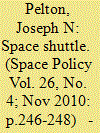

|
|
|
|
|
| Publication |
2010.
|
| Summary/Abstract |
The Space Transportation System (STS), for better or worse, has dominated the US space program for some 30 years and is now an American icon. The Space Shuttle orbiters have flown over 120 missions and certainly accomplished some amazing feats, including the deployment of the International Space Station (ISS), the launch and double repair of the Hubble Telescope, a number of classified missions for the US defense establishment and the cementing of international cooperation in space. As the remaining Space Shuttle orbiters head toward various museums, it is timely to look at the STS program in terms of key US space policy decisions that have paralleled the Space Shuttle's often troubled history. This article seeks, from both a historical and a policy perspective, to assess what might have been. While noting the major accomplishments of the STS, it also identifies what can best be characterized as major lost opportunities and flawed policy decisions that have had multi-billion dollar consequences. In this regard, the US Congress, the White House, and NASA leadership have all played a role. If there have been failings, they have not been by NASA alone, but the entire US space policy leadership.
|
|
|
|
|
|
|
|
|
|
|
|
|
|
|
|
| 6 |
ID:
142558


|
|
|
|
|
| Summary/Abstract |
After the Cold War ended in the disintegration of the Soviet Union, the space race was not the factor behind the space exploration and exploitation anymore. The aim of this paper is to analyze the transatlantic space cooperation between the USA (more specifically NASA) and the ESA. The cooperation can be driven by two major motives – economic and political. The empirical evidence suggests that while ESA is motivated by the economic one NASA is motivated by the political one. ESA is seemingly on NASA's tail but it benefits economically.
|
|
|
|
|
|
|
|
|
|
|
|
|
|
|
|
| 7 |
ID:
142555
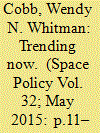

|
|
|
|
|
| Summary/Abstract |
This article addresses a timely and widespread issue, that of public opinion and the rise of “big data.” Analysts of US space policy have consistently noted the role that public opinion plays in setting the directions for US space exploration. However, the tools that have been used to measure public opinion suffer from serious shortcomings in terms of timing and lack of available data. This paper introduces two new measures of public opinion, Google Trends and Twitter, and details how they can be used to assist in measuring interest in space policy in the American public.
|
|
|
|
|
|
|
|
|
|
|
|
|
|
|
|